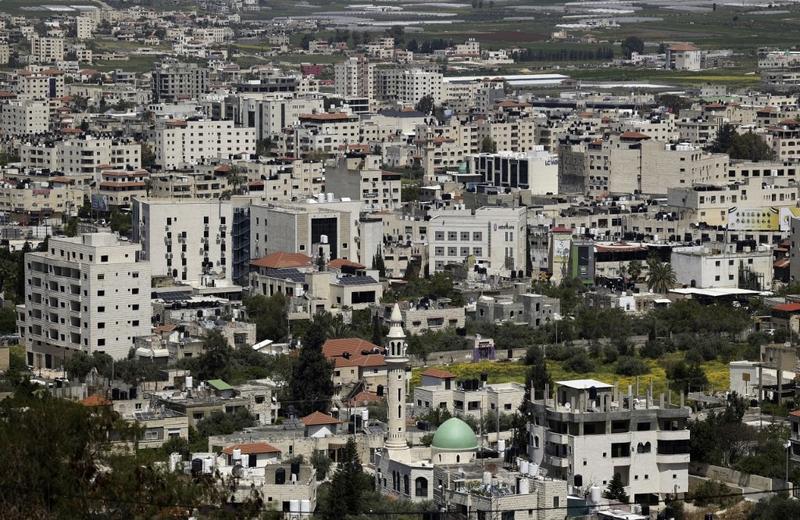 This picture shows a general view of the West Bank town of Jenin on April 12, 2022.
(ABBAS MOMANI / AFP)
This picture shows a general view of the West Bank town of Jenin on April 12, 2022.
(ABBAS MOMANI / AFP)
Israel’s new rules to tighten foreigners’ visits to the West Bank areas that it occupies could threaten the sustenance of some 2 million people who need humanitarian assistance, experts said. The new rules target universities, nongovernmental groups, businesses, and family unification activities.
They said Muslim countries of the 57-member Organisation of Islamic Cooperation, headquartered in Saudi Arabia, can play a critical role in putting a stop to Israel’s aggression by recognizing that the Palestinian issue “is part of its existence”.
“The OIC's charter clearly shows how deeply embedded the Palestinian issue is in the existence of the Muslim body. Because of OIC’s untiring efforts, the UN (designated) March 15 as International Day to Combat Islamophobia, which is a testament to what the OIC body can achieve if they are on the same page,” Arhama Siddiqa, a Middle East expert at the Institute of Strategic Studies Islamabad in Pakistan, told China Daily.
The Organisation of Islamic Cooperation's charter clearly shows how deeply embedded the Palestinian issue is in the existence of the Muslim body. Because of OIC’s untiring efforts, the UN (designated) March 15 as International Day to Combat Islamophobia, which is a testament to what the OIC body can achieve if they are on the same page.
Arhama Siddiqa, Middle East expert at Institute of Strategic Studies Islamabad in Pakistan
"Muslims make up a significant portion of the world population. They can insert collective pressure for one,” she added.
On April 27, Doha-based media outlet Aljazeera reported that a 97-page Israeli ordinance, called Procedure for Entry and Residence for Foreigners in Judea and Samaria Area, will replace the current four-page policy. The report said the Israeli government uses the terms “Judea” and “Samaria” to refer to the West Bank.
READ MORE: Islamic nations stress need for Afghan aid
The report said the new policy differentiates between travelers who seek to visit Palestinians in the West Bank and those who visit Israeli settlers. Only those who visit Palestinians must obtain prior approval. Israeli authorities say, the report added, that restrictions on travel to the West Bank are “necessary for security reasons”.
The Jerusalem Post reported on May 1 that Israel has now postponed the imposition of the new restrictions to July following a legal appeal. The restrictions were first published in February by the office of the Coordinator of Government Activities in the Territories or COGAT. COGAT is the Israeli military’s civil body that administers the West Bank.
“Now because of Israel’s new restrictions, many professors and teachers will not be able to come back to Birzeit University and other Palestine universities. We have the right to raise our voice. Why (will) Israel restrict the right to education in Palestine,” asked Mohammad Abualrob, an assistant professor and chairperson of the Department of Media at Birzeit University in the West Bank.
Walaa Sabah, community outreach and partnership officer at We Are Not Numbers, or WANN, a youth-led Palestinian nonprofit project in Gaza, also occupied by Israel, said the new rules will have a severe impact on humanitarian aspects.
“We Are Not Numbers is not limited to Gaza only, but it extends all over the globe, and most definitely the West Bank. We are now awaiting a delegation from the UK to visit Gaza, and it seems that the process is so complicated. They have been trying to get access for over 3 months and were not able to get permission until now,” Sabah told China Daily.
She said preventing such delegations from entering “will hinder any improvements” in the humanitarian situation.
“We welcome any initiative from neighboring countries to help lift the siege in Gaza and facilitate the daily life of Palestinians. However, at WANN, we work toward providing political education and training in journalism and creative writing to help people advocate for human rights and have their voices heard without the need (for) any mediators,” said Sabah.
At a meeting on April 25, Hissein Brahim Taha, secretary-general of the OIC, reaffirmed the OIC’s support for the right of the Palestinian people to sovereignty over their occupied land, including East Jerusalem as the capital of the State of Palestine.
ALSO READ: Medics: Palestinian killed in clashes with Israeli soldiers in West Bank
He also urged all international actors to assume their responsibilities and get involved to sponsor a political track to end the Israeli occupation. The meeting was held at the request of Indonesia and presided over by Saudi Arabia, chair of the 14th Islamic Summit.
Indonesian media reported that Indonesia’s House of Representatives’ Committee for Inter-Parliamentary Cooperation Chair Fadli Zon had confirmed that the committee will visit Palestine in May to bolster bilateral relations between Indonesia and Palestine.
Belal Alakhras, a political analyst and Palestinian researcher at the University of Malaya in Malaysia, told China Daily that when a large number of countries declare a firm stance against Israeli oppression, Israel is likely to reconsider its proclivity to violate Palestinian sovereignty and right to self-determination.
The countries that border Palestine, and other interested nations, can provide significant assistance to the Palestinian people, Alakhras said, allowing them to “rely on themselves to live a dignified and free life in their land”.


